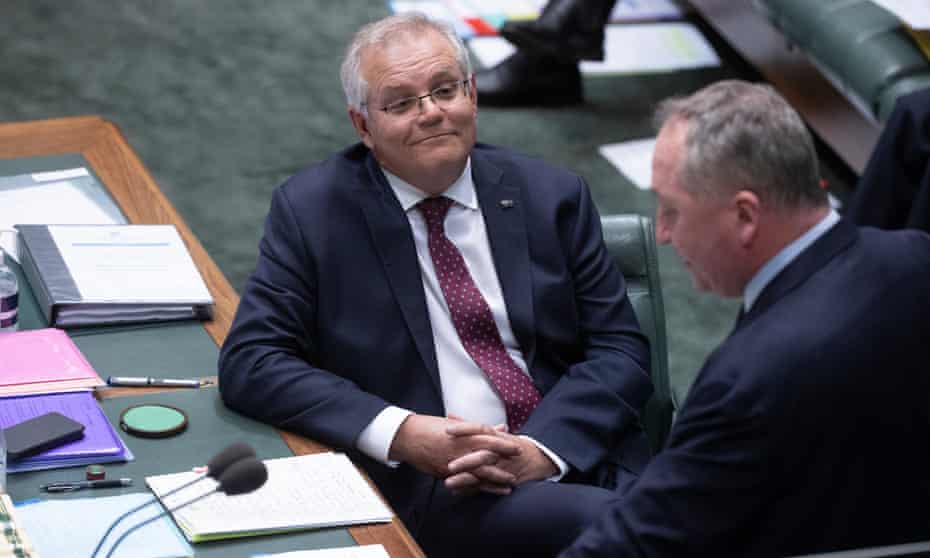‘Utterly his own right’ for Scott Morrison to commit to net zero, Barnaby Joyce says
Liberals and Nationals increasingly confident the Coalition is moving towards agreement on climate pivot

Barnaby Joyce has acknowledged that Scott Morrison can commit Australia to a new net zero target without the endorsement of the Nationals’ party room.
With Liberals and Nationals increasingly confident the Coalition is now moving towards an agreement before the Cop26 in Glasgow, Joyce said on Tuesday: “The government decision on the government’s commitments for Australia in relation to Cop26 will be made by the government in cabinet.”
The deputy prime minister told reporters Morrison had “his own mandate and he has his own capacity and that is absolutely and utterly his own right”.
On Monday Morrison told Liberals concerned about the oversized Nationals’ influence on climate policy that net zero would be a cabinet decision, and the new target would be more than rhetorical – it would be expressed as a nationally determined contribution under the Paris agreement.
The prime minister’s reference to cabinet was an implicit warning that any ministers who ultimately disagree with a net zero commitment will need to consider their positions. He also warned there would be price to pay if Australia failed to join key allies in embracing a 2050 target.
Morrison wants to unveil a new roadmap laying out the transition to net zero before he departs for Glasgow. Liberals and Nationals have been briefed on that work, which is underpinned by Treasury modelling.
Negotiations are also continuing with the Nationals about an accompanying package that would include significant funding for regional job creation initiatives and infrastructure projects.
Liberals and Nationals met in Canberra on Tuesday for the first time since the government’s net zero discussion has gathered pace.
Senators Gerard Rennick and Matt Canavan continued to express opposition to the climate policy shift. According to colleagues, Canavan suggested a net zero commitment was ephemeral, like the Liberal party’s “jobs and growth” slogan in the 2016 election that the Coalition almost lost.
In the Liberal party room that preceded Tuesday’s joint party room meeting, Trent Zimmerman, Julian Leser and Lucy Wicks spoke in support of net zero. The Queensland MP Garth Hamilton expressed some reservations.
While the Nationals now appear to be positioning for an inevitable landing point on net zero, support for the shift will not be unanimous in the party room. As part of the negotiations, the junior Coalition partner has also effectively vetoed any significant increase in the 2030 target before the Cop26.
Morrison was hoping to land a formal increase to Australia’s medium-term target as well as the commitment to net zero to unveil in early November at the UN-led climate talks.
The government would have had scope to formally increase the 2030 target courtesy of new projections expected to show that Australia will over-achieve on the Abbott-era 2030 target of a cut of between 26% and 28% on 2005 levels – largely because of ambitious action in the states. Updated projections are expected this week.
A report by researchers at Climate Analytics said it was likely the new projections would forecast that emissions would fall by between 30% and 38% by 2030. The US and the UK, and a number of business and investor groups, have urged the government to increase ambition for 2030.
With the Nationals effectively vetoing a pre-Glasgow shift on the 2030 target, Liberals now think Morrison could promise to increase the 2030 target as an election commitment.
Since Sunday, when Joyce vetoed an increase in the 2030 target, Morrison has been emphasising that the current 26 to 28% reduction was an election commitment in 2019, meaning it would be difficult to update the target without putting that to voters.
He made it clear on Monday he intends to trumpet the projected over-achievement at the Glasgow conference. But the US and the UK – the key partners in Australia’s new nuclear submarine pact – will want Australia to update the current target.
The prime minister has been under increasing pressure from the investment and business community to commit to cutting emissions by about 50% by 2030, in line with scientific advice and goals set by major developed nations before Glasgow.
Sources say Australia raised with both the UK and US governments the idea of publicly declaring it would “overachieve” on its 2030 target without formally increasing the goal.
But both allies have pressed Morrison to deliver the formal increase rather than window dressing.
